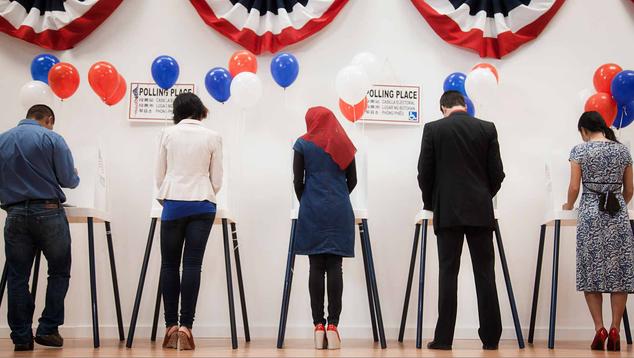The Wall Street Journal columnist Gerald Seib recently noted that Republicans were gearing up to focus 2022 midterm voters' attention on the "three I's" -- inflation, immigration and identity politics.
The first two of these are fairly straightforward, with the main focus centering on how candidates and political parties propose to address them. Public opinion polling on these issues is abundant. Gallup's Mohamed Younis recently reviewed the evidence relating to public opinion and inflation, and Gallup analysts over the years have done a great deal of work focusing on Americans' views on immigration.
But the third -- identity politics -- is less specific, more complicated, and an issue about which there isn't a lot of direct public opinion research.
Identity politics generally refers to people evaluating issues through the lens of their association with a specific group. This in turn means that approaches to issues, politicians and political parties revolve around how those things affect the relevant group or groups. This can include the conviction that one's group is being oppressed or discriminated against either by larger groups or by society as a whole. Identity politics can also create backlashes among those who disagree with what it means for the rest of society.
As noted, we don't have much research I'm aware of that asks Americans directly whether any particular aspect of their identity drives their political views. A more frequently researched offshoot of identity politics is "critical race theory," which approaches a variety of topics -- history, literature, science, criminal justice, medicine, and many more societal structures and institutions -- from the perspective of the unequal situation of Black Americans, and how that in turn is embedded in structures, law and legal institutions of society. Recent polling on this topic shows that while about a third of Americans are not familiar with critical race theory, those with an opinion about it being taught in schools lean more negative than positive.
No Shortage of Groups With Which to Identify
There are many different groups with which Americans can identify, ranging from those based on ascriptive characteristics (traits we are born with, such as race, ethnicity, sex and social class positioning of one's parents) to those based on circumstances and choices that develop as people move through life, including political party, religious affiliation, geographic location, socioeconomic status, and club and group memberships.
The groups most commonly associated with identity politics in today's political environment center on race, ethnicity, religion, gender and sexual orientation. An interesting reference point in this regard comes from Joe Biden's 2020 campaign website, on which he listed 19 different identity groups for which he had specific plans. These included tribal nations, women, people with disabilities, Black Americans, military families, union members, rural Americans, older Americans, the LBGTQ+ community, veterans, the Catholic community, students/young Americans, immigrants, the AAPI (Asian American Pacific Islander) community, the Indian American community, the Jewish community, the Muslim American community, the Latino community and the Arab American community. Others would point out that White conservatives or political liberals can also constitute political identity groups.
Criticisms of identity politics tend to center not so much on the idea that people's group identity should be important in their politics, but on ways in which identity politics has been positioned by its advocates. This includes criticism of the rigid norms of verbal behavior that are supposed to be used in reference to identity groups, and criticism of the assumptions that people not in particular identity groups are responsible for the negative situation of those who are.
Additionally, some observers (including the winning candidate in Virginia's gubernatorial race in November) equate identity politics with critical race theory, and criticize the latter's introduction into school curricula and elsewhere.
The whole issue of how humans do or do not identify themselves with various group characteristics and how this impacts their politics is highly complex and has elements that involve scholarly fields such as sociology, psychology, political science, history, anthropology and genetics. Most generally, I think it's fair to conclude that tribal membership and group identification are powerful forces in almost all contemporary societies. This makes it not surprising that identity groups can play a significant role in U.S. politics.
Putting Identity Politics in the Context of All of Society's Challenges
The focus on identity politics is basically a focus on the internal aspects of the way societies work. Those who view their politics through their identity, we can assume, see this focus as necessary to keep society running in a just manner, which in turn helps maintain societal stability.
This contrasts with a focus on the external challenges faced by society -- fending off the threats that could cripple or annihilate society totally. Author Yuval Noah Harari has distilled these massive, external challenges down to three primary threats: nuclear war, ecological collapse and technological disruption. The pandemic brought to our attention a fourth -- the potential threat of biological agents. A broader list of external challenges would include the inability to sustain economies, food and water shortages, providing sources of energy, inequality, and non-nuclear warfare.
Social systems clearly need to focus on both internal and external challenges. If a society's major emphasis is on internal issues surrounding the status and wellbeing of identity groups, then attention can be diverted from external challenges with potentially disastrous consequences. And, if the major emphasis in a society is on external challenges, the system can crash and burn if the people within the system perceive injustice and eventually rebel and revolt.
The People's Priorities
As noted, we don't have much public opinion research that deals with identity politics per se, but we do have research that gives us a feel for the general, broad priorities people give to challenges facing society.
Gallup's "most important problem" data are valuable in this regard. The top 10 problems from the perspective of the American public from Gallup's most recent November update are: government/poor leadership, COVID, the economy in general, immigration, the high cost of living/inflation, unifying the country, unemployment/jobs, race relations, the environment/climate change, and ethical/religious/moral decline. I would classify all but three of these (the need to unify the country, race relations and ethical/religious/moral decline) as external threats. The priority given to government as the top problem reflects the view that the political system is inefficient in dealing with all types of threats.
Earlier this year, Pew Research gave Americans a list of issues and asked them whether each should be a top priority for Congress and the president. The top 10 are, in rank order: strengthening the economy, dealing with COVID, improving the job situation, defending against terrorism, improving the political system, reducing healthcare costs, strengthening Social Security, improving education, dealing with the problems of poor people and addressing issues around race. Again, all but two of these (dealing with the problems of poor people and addressing issues around race) are what I would classify as external challenges, with improving the political system a broad "catchall" category.
This relative priority given to external problems and priorities is not surprising. External threats such as biological plagues, a crumbling economic system, terrorism and ecological damage in theory affect all members of a society and represent clear and present dangers.
The impact of internal challenges, including those that arise out of identity politics, are often less immediate or less personally relevant. Identity politics in many cases deals with the challenges revolving around groups that are in the minority. This makes it less probable (but certainly not impossible) that a majority of the members of society will view these groups' situations as a critical problem or assign them a high priority. At the same time, evidence shows that issues centering on minority groups can rise in importance in certain situations. In late May/early June 2020, just after George Floyd was murdered by a Minneapolis police officer, 19% of Americans mentioned race relations as the top problem facing the nation -- the highest such percentage since 1968. Plus, issues revolving around identity groups that encompass a majority of the population (such as White Americans or women) can essentially by definition gather broad support.
In any case, political issues do not have to engender majority support to have a major effect on the political system. Many so-called wedge issues are critically important to smaller slices of the electorate, and their votes can turn out to be decisive. The ultimate impact of identity politics in next year's midterms and in future elections, as a result, remains to be determined.




